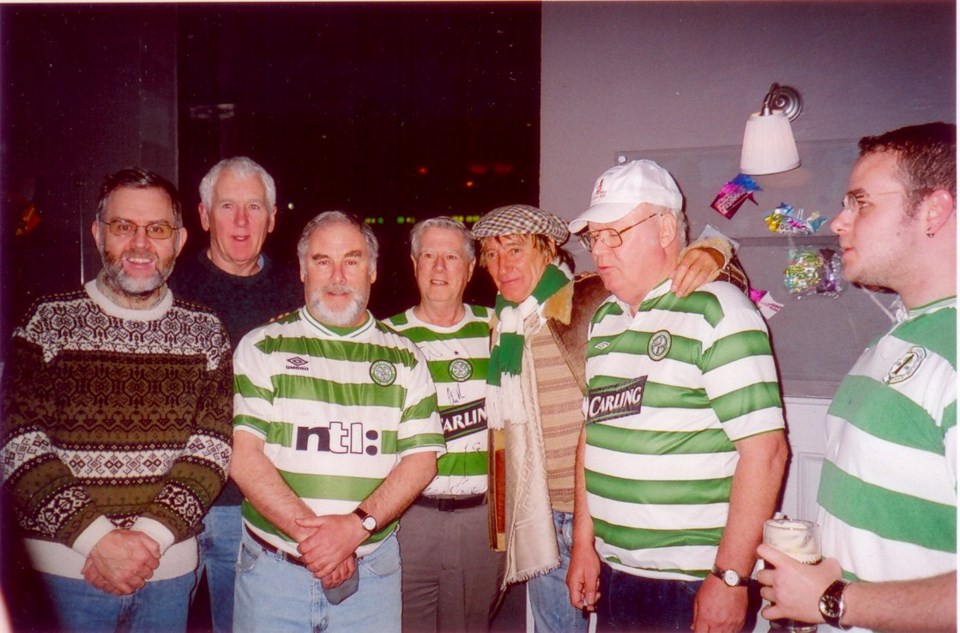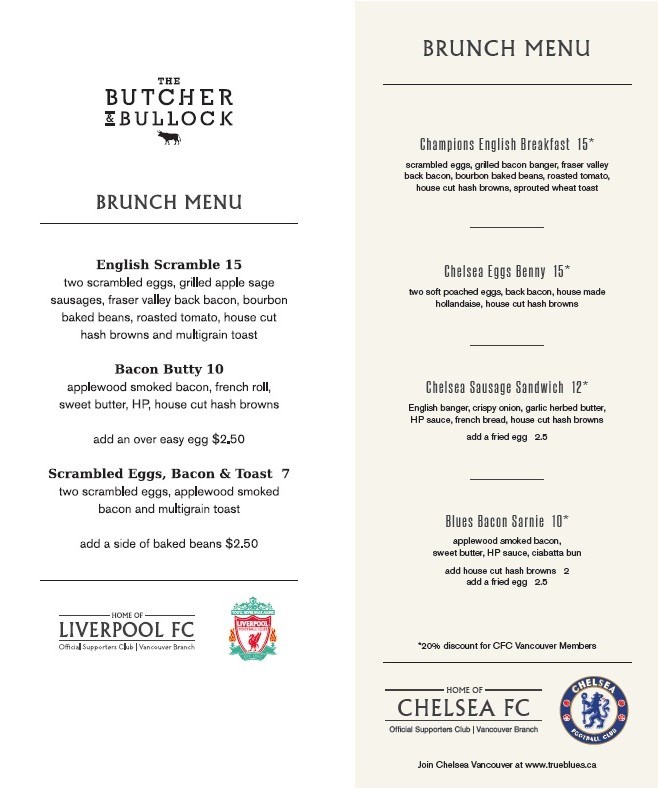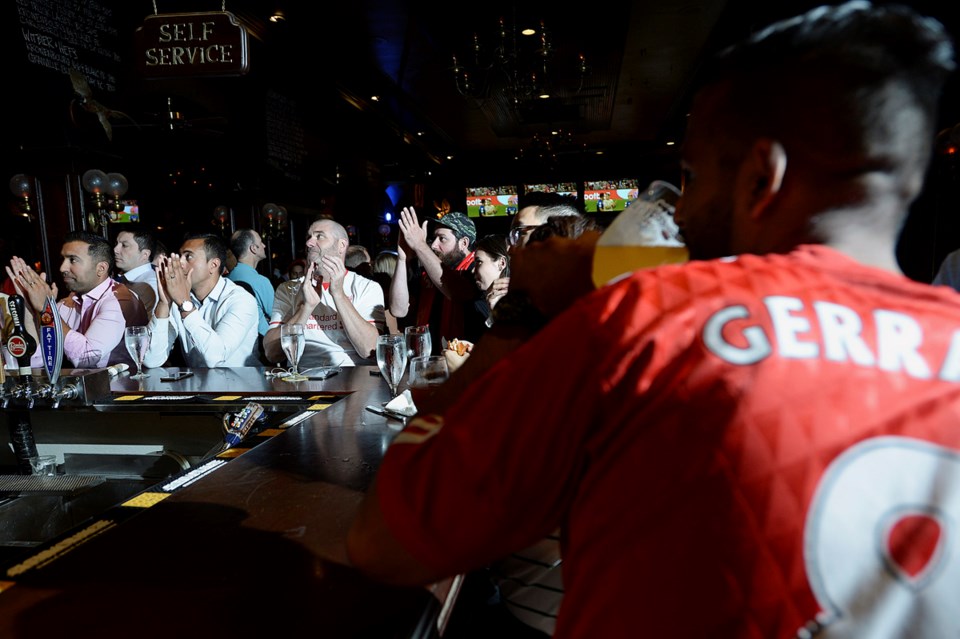Rise before dawn, stand in the rain, wait for a pub to open its doors and switch on the telly, hopefully in time for kick-off half a world away.
It’s a common experience for football fans like bhoys, gooners and scousers who rank sports allegiance as an integral part of their identity and liken fandom to religious affiliation. It was the familiar trope in Vancouver until the owners of one bar tossed over the keys so fans of Scottish side Celtic could let themselves in for a 5 a.m. match and turn the coffee pot on along with the television.
“We literally used to watch the games as the cleaners were in sweeping up broken glass from the night before,” said Randel Dupuis, a member of the city’s oldest such group, the Vancouver Shamrock Celtics Supporters Club.
“We were the only way of seeing the games back in those days, and any Glaswegian wanting to watch Celtic had to prevail upon our hospitality. If you check our website, you'll see pictures ofRod Stewart himself catching a game with us while he was in town performing.”

Founded in 2000, the Shamrocks moved from the Croatian Cultural Centre and eventually adopted the Library Square Public House as their base. As Dupuis wrote in an email, “[It’s] the lone outpost for the best of the Scottish game. A Celtic FC scarf enjoys pride-of-place above the bar.”
Owned by the Donnelly Group, the pub set an example that many in the chain have followed: for Barclays English Premier League football, Chelsea FC fans congregate at the New Oxford; scousers watch Liverpool FC at the Butcher and Bullock; Manchester City FC games are on at the Blackbird; the Bimini hosts Tottenham Hotspur FC fans; Manchester United FC supporters crowd the Lamplighter.
The Scottish Premier League hosts bhoys (and ghirls) at Library Square and Rangers FC supporters at the Three Brits Public House.
The Pint, where Arsenal FC fans congregate, is one of the few venues outside the Donnelly chain to host official supporters clubs of English and Scottish premier league soccer.
Never walk alone
At noon on Monday, the second week of the winter season since the EPL started Aug. 8, more than 150 men and a dozen women packed into the downtown Butcher and Bullock, a stately but windowless watering hole in the financial district. Two suited men at the bar had taken off their jackets and were forking Cesar salads. By the time the second half of the Liverpool match began, they’d left, vacating their bar stools for new patrons, these ones wearing red Gerrard jerseys and drinking lager.
The Butcher and Bullock is the formal home of the Liverpool FC Official Supporters Club, a united crowd of Vancouverites and English expats led by president Steve Speed. He’s a Liverpudlian-turned-Canadian living on the West Coast since 2005 who has three Liverpool tattoos on this body, including the Liverbird city emblem on his calf with a maple leaf and club’s song-turned-motto, “You’ll Never Walk Alone,” the loyalty proudly stamped on his lower back. He wrote a book about former Liverpool FC stars called Ex-Reds Remembered.
Getting fans in the door can be surprisingly simple, he said.
“The main thing is to open the doors and let people in. Don’t have people standing in the rain one minute until the game starts.”
Watch this video until you see tears roll down the faces of crying men.
Some English and Scottish premier league games start at 4:30 a.m. on this coast, but management at the Butcher and Bullock has gone far beyond opening the doors. They designed 250 custom-made scarves with Liverpool FC flanked by the pub’s emblem on one end and the supporters’ crest on the other. They also put up prizes, including a B.C. Place pitch-level corporate box at exhibition games and a portion of the cost for members to visit Los Angeles to see former Liverpool players on a speaking tour.
The Liverpool supporters group made their home at two different bars. Speed said a small group gathered at Library Square but, only naturally, “The Celtic bhoys weren’t very happy sharing because they had a lot of rank there.” Eventually, he said, “They wouldn’t let us in to watch our games live.”
The scousers soon found a new haunt but the president said the relationship deteriorated after seven years in 2013. “Staff members complain to people in our club about getting up early to open the doors.”
A member of the club also worked at a Donnelly restaurant and suggested the place that was formerly Smiley’s, the ground-level pub which came under Donnelly ownership in 2009. A few years later, the Bull was branded and for two years the Liverpool supporters’ club has filled it with hundreds of fans every week during the season.
Bangers and Butties
It doesn’t hurt Liverpool fans that a Donnelly marketing manager, Damon Holowchak, is a scouser, which is a kind of hearty, working-class stew that’s come to stand in for Liverpool fans. [[Author's note Update from Holowchak: "One small note, I am a 'Red' or LFC supporter, but though honoured, to be scouse, you need to be from Liverpool, and I am not." A scouser is not necessarily a Liverpool FC fan, but someone from the city. Holowchak grew up in Pitt Meadows.]]
He said the Donnelly Group, a Vancouver restaurant company launched in 1999 by Jeff Donnelly, couldn’t force a relationship with football fans. “It had to be organic,” Holowchak said Monday, a red scarf around his neck as Liverpool FC went on its way to defeat Bournemouth 1-0.

The key was embracing “traditional pub values,” which means making people want to come in, stay and then return, eventually treating an establishment as their local. Once a supporters club feels welcome, it’s up to them to declare a pub their official home.
(Supporters groups charge membership and maintain a formal affiliation with the football club. This includes supporting former players on North American speaking tours and comes with the benefit of receiving a few highly coveted tickets to the home stadium.)
The menus at various bars cater to the English and Scottish soccer fans who fill the places each week. Members also get discounts on food such as the “Champions English Breakfast” of grilled bacon bangers, back bacon, baked beans and tomato.
At the New Oxford, menu items include the Chelsea Eggs Benny and Chelsea Sausage Sandwich. The Blues Bacon Sarnie is especially tailored to Blues fans. The bacon and butter toasted sandwich, however, is a lot like the Bacon Butty, the same dish with a different name when printed on the menu at the Butcher and Bullock.
“Don’t tell them it’s the same thing,” one Donnelly employee quipped. Both sell for $10 and are served with HP sauce.
Channel changes
For Canadians (and migrants to Canada) of a certain generation, tuning in to watch European or Latin American football clubs meant pay-per-view cable or satellite dishes to avoid the unbearable oblivion of not watching at all. Today’s audiences can watch more games than ever before in Canada or stream (legally and otherwise) matches while connecting with likeminded viewers on a second screen in real time.
Growth of Major League Soccer and the supporters clubs for the Vancouver Whitecaps FC has ramped up interest in soccer although British football fans say nothing in Canada compares to the devotion they show their teams. “Even Canucks fans during the playoffs can’t match us for an early-season game,” said one English supporter.
In the U.S., NBC Sports Group committed to air all 380 English Premier League matches available through the 2021-22 season. The fan base is growing and not just among the committee members who pay for the right to be official.
Perhaps ironically, easy viewing access has diminished the need for some fans to gather together.
“We used to have a pair of dedicated cable boxes at the pub to get our domestic and international games, but the availability of games online, coupled with improved coverage on Sportsnet and TSN have made such devices unnecessary,” said Dupuis with the Celtic fan group. “Our operating costs are a fraction of what they were back in the day, but membership has been in decline as well, as fans can now watch from the comfort of their own homes rather than driving downtown in the wee hours.”
To compound the smaller Shamrocks crowds, Dupuis explained how the demise of the Old Firm has dampened broader appeal in Celtic. A hated rival is a rival no more.
“The other mitigating factor in decreased numbers has been the demise of Celtic's chief rival from the other side of Glasgow, Rangers FC,” he wrote, pointing out the cross-town rivalry is one of the oldest and nastiest in sports. The club entered bankruptcy protection in 2012 and were eventually liquidated. A new Rangers side has formed but still plays in the lower division below Celtic.
“Needless to say, the Celtic faithful used to turn out in droves to cheer their side on against the old enemy. We'd show the games live at 5 a.m. in those days with 50 or so Celtic supporters in attendance — and even a few brave Rangers fans on occasion! We have always prided ourselves on welcoming fans of other teams into our midst and we still routinely get Aberdeen and Dundee United supporters turning up for matches. Apart from a bit of friendly banter, everyone is always on their best behavior.”
On most weekends, Dupuis says the morning matches will be delayed until noon so spectators can gather after the sun has risen.
“The biggest challenge,” he said, “is staying off the various social media outlets beforehand and accidentally stumbling across the score.”
Twitter and Instagram: @MHStewart



